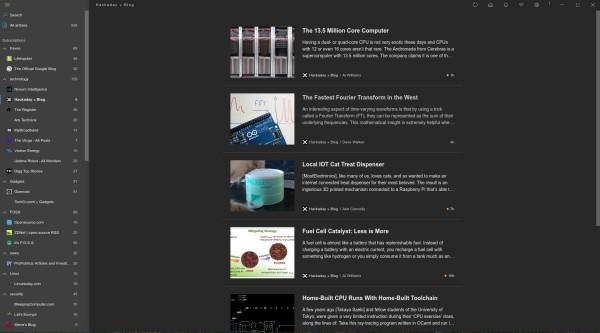I’ve happily been using self-hosted web-based FreshRSS for a while now. I chose it mainly because it suited my needs, and when I travelled regularly, I could work from the same shared source of articles. But the last while I’ve noticed some feeds lag really slowly with fetching the feed content (it may be my slowish hosting at home where I have 10 other services running), and with the addition of Full Text RSS to retrieve full text where feeds only contain snippets, this was pushing my server over its memory resources.
Seeing I work permanently from home now, I thought I should look again at desktop based RSS readers. Well there are a lot of choices, but I was after full text retrieval in reader mode, without adverts. So I got down to Liferea (really feature packed), RSS Guard, and QuiteRSS. All retrieved full text articles with ad blocking etc. But these all have similar interfaces with minor differences, and all still have that older look and feel. They worked, but something felt sticky with the reading flow. I scan a good 500 articles per day, and my initial scanning is quite important to me.
I had ignored Fluent Reader initially as it is Electron based. But I thought today I’ll just try it and see. Yes, with Electron it obviously has the more modern feel to it, but this became really apparent with the intermediate view that I so need (and which I used in FreshRSS). My favourite view is a post headline, with some short snippet of text along with an image. So immediately I saw Fluent Reader has this (Magazine view), as well as a few other viewer options.
Out of the box it has all the basics I’d use, it has no detailed stats like FreshRSS has, nor the depth of options that Liferea, QuiteRSS and RSS Guard have (nor the integration with the desktop OS; and it’s Electron!). But it has great workflow and can produce a full text reader view.
But it is fast and helps me do what I want to do really quickly and easily. Liferea for example uses only 145 MB of memory, whilst Fluent Reader has 7 processes running and which consume a total of 264 MB. Both use 0% CPU when not fetching feeds.
It is open source and will install on Windows, Linux, macOS, iOS, and Android.
But as there are so many options out there, and everyone’s needs are different, it is always best to first take stock of what you really need as far as features go, and then narrow your choices down from there. A good RSS reader allows you to consume vast amounts of information in a focussed and efficient way, so getting your own choice right, can really help you. You can easily export, and import, your feed sources list between applications, so it is not difficult to do hand-on comparisons.
See https://github.com/yang991178/fluent-reader
#technology #RSS #RSSreader #news #FluentReader

